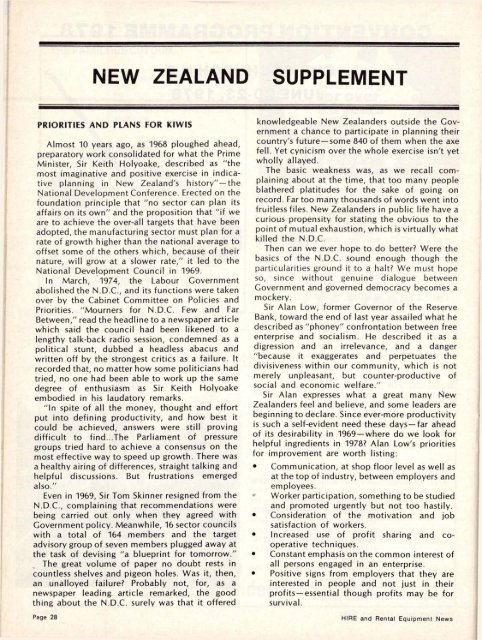new products - Hire and Rental Industry Association
new products - Hire and Rental Industry Association
new products - Hire and Rental Industry Association
Create successful ePaper yourself
Turn your PDF publications into a flip-book with our unique Google optimized e-Paper software.
NEW ZEALAND SUPPLEMENT<br />
PRIORITIES AND PLANS FOR KIWIS<br />
Almost 10 years ago, as 1968 ploughed ahead,<br />
preparatory work consolidated for what the Prime<br />
Minister, Sir Keith Holyoake, described as "the<br />
most imaginative <strong>and</strong> positive exercise in indicative<br />
planning in New Zeal<strong>and</strong>'s history" —the<br />
National Development Conference. Erected on the<br />
foundation principle that "no sector can plan its<br />
affairs on its own" <strong>and</strong> the proposition that "if we<br />
are to achieve the over-all targets that have been<br />
adopted, the manufacturing sector must plan for a<br />
rate of growth higher than the national average to<br />
offset some of the others which, because of their<br />
nature, will grow at a slower rate," it led to the<br />
National Development Council in 1969.<br />
In March, 1974, the Labour Government<br />
abolished the N.D.C., <strong>and</strong> its functions were taken<br />
over by the Cabinet Committee on Policies <strong>and</strong><br />
Priorities. "Mourners for N.D.C. Few <strong>and</strong> Far<br />
Between," read the headline to a <strong>new</strong>spaper article<br />
which said the council had been likened to a<br />
lengthy talk-back radio session, condemned as a<br />
political stunt, dubbed a headless abacus <strong>and</strong><br />
written off by the strongest critics as a failure. It<br />
recorded that, no matter how some politicians had<br />
tried, no one had been able to work up the same<br />
degree of enthusiasm as Sir Keith Holyoake<br />
embodied in his laudatory remarks.<br />
"In spite of all the money, thought <strong>and</strong> effort<br />
put into defining productivity, <strong>and</strong> how best it<br />
could be achieved, answers were still proving<br />
difficult to find...The Parliament of pressure<br />
groups tried hard to achieve a consensus on the<br />
most effective way to speed up growth. There was<br />
a healthy airing of differences, straight talking <strong>and</strong><br />
helpful discussions. But frustrations emerged<br />
also."<br />
Even in 1969, Sir Tom Skinner resigned from the<br />
N.D.C, complaining that recommendations were<br />
being carried out only when they agreed with<br />
Government policy. Meanwhile, 16 sector councils<br />
with a total of 164 members <strong>and</strong> the target<br />
advisory group of seven members plugged away at<br />
the task of devising "a blueprint for tomorrow."<br />
The great volume of paper no doubt rests in<br />
countless shelves <strong>and</strong> pigeon holes. Was it, then,<br />
an unalloyed failure? Probably not, for, as a<br />
<strong>new</strong>spaper leading article remarked, the good<br />
thing about the N.D.C. surely was that it offered<br />
Page 28<br />
knowledgeable New Zeal<strong>and</strong>ers outside the Government<br />
a chance to participate in planning their<br />
country's future—some 840 of them when the axe<br />
fell. Yet cynicism over the whole exercise isn't yet<br />
wholly allayed.<br />
The basic weakness was, as we recall complaining<br />
about at the time, that too many people<br />
blathered platitudes for the sake of going on<br />
record. Far too many thous<strong>and</strong>s of words went into<br />
fruitless files. New Zeal<strong>and</strong>ers in public life have a<br />
curious propensity for stating the obvious to the<br />
point of mutual exhaustion, which is virtually what<br />
killed the N.D.C.<br />
Then can we ever hope to do better? Were the<br />
basics of the N.D.C. sound enough though the<br />
particularities ground it to a halt? We must hope<br />
so, since without genuine dialogue between<br />
Government <strong>and</strong> governed democracy becomes a<br />
mockery.<br />
Sir Alan Low, former Governor of the Reserve<br />
Bank, toward the end of last year assailed what he<br />
described as "phoney" confrontation between free<br />
enterprise <strong>and</strong> socialism. He described it as a<br />
digression <strong>and</strong> an irrelevance, <strong>and</strong> a danger<br />
"because it exaggerates <strong>and</strong> perpetuates the<br />
divisiveness within our community, which is not<br />
merely unpleasant, but counter-productive of<br />
social <strong>and</strong> economic welfare."<br />
Sir Alan expresses what a great many New<br />
Zeal<strong>and</strong>ers feel <strong>and</strong> believe, <strong>and</strong> some leaders are<br />
beginning to declare. Since ever-more productivity<br />
is such a self-evident need these days —far ahead<br />
of its desirability in 1969 —where do we look for<br />
helpful ingredients in 1978? Alan Low's priorities<br />
for improvement are worth listing:<br />
• Communication, at shop floor level as well as<br />
at the top of industry, between employers <strong>and</strong><br />
employees.<br />
• Worker participation, something to be studied<br />
<strong>and</strong> promoted urgently but not too hastily.<br />
• Consideration of the motivation <strong>and</strong> job<br />
satisfaction of workers.<br />
• Increased use of profit sharing <strong>and</strong> cooperative<br />
techniques.<br />
• Constant emphasis on the common interest of<br />
all persons engaged in an enterprise.<br />
• Positive signs from employers that they are<br />
interested in people <strong>and</strong> not just in their<br />
profits —essential though profits may be for<br />
survival.<br />
HIRE <strong>and</strong> <strong>Rental</strong> Equipment News





